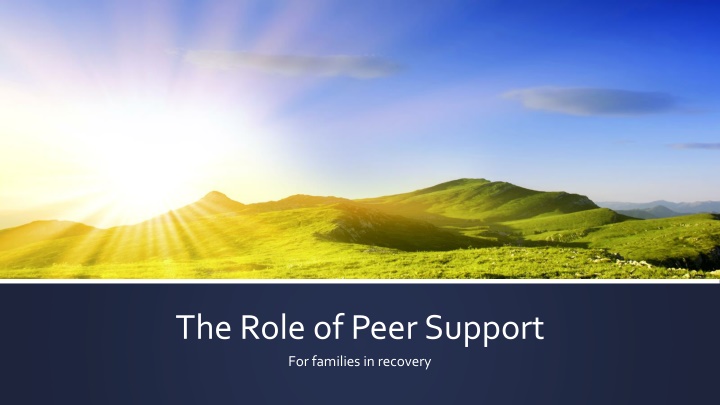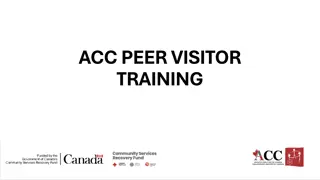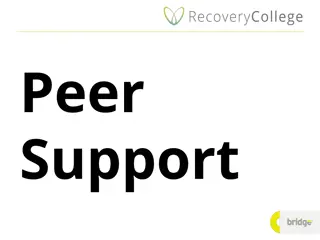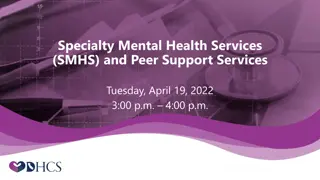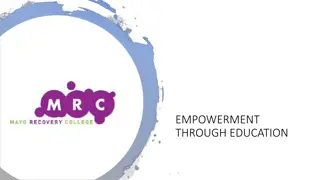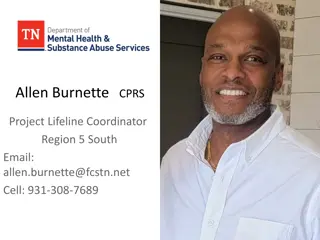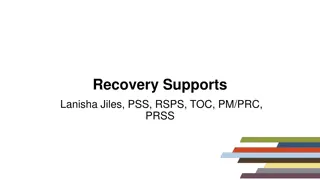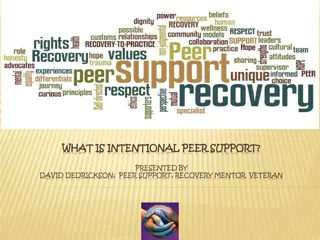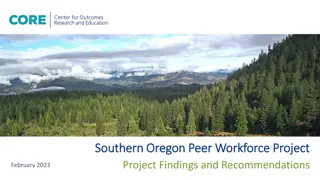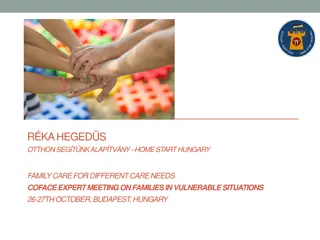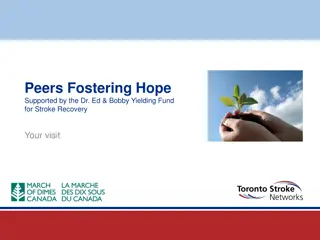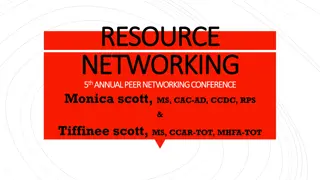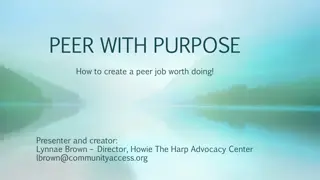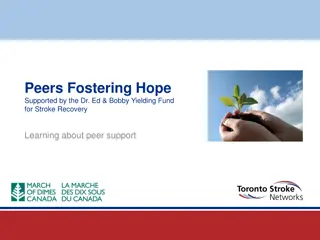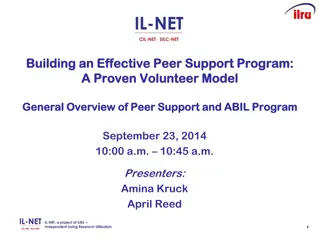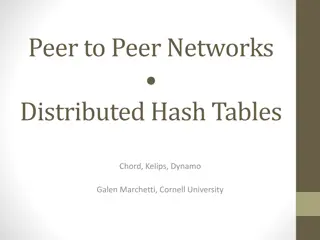Peer Support for Families in Recovery
Peer support plays a crucial role in the recovery of families facing challenges, providing knowledge, experience, emotional support, and practical help. Through lived experiences, individuals like Amanda Metcalf offer hope, encouragement, and tools for others to rebuild their lives and find long-term sobriety. Discover the impact of peer support on families in recovery and the transformative journey of those who have received and offered support.
Download Presentation

Please find below an Image/Link to download the presentation.
The content on the website is provided AS IS for your information and personal use only. It may not be sold, licensed, or shared on other websites without obtaining consent from the author.If you encounter any issues during the download, it is possible that the publisher has removed the file from their server.
You are allowed to download the files provided on this website for personal or commercial use, subject to the condition that they are used lawfully. All files are the property of their respective owners.
The content on the website is provided AS IS for your information and personal use only. It may not be sold, licensed, or shared on other websites without obtaining consent from the author.
E N D
Presentation Transcript
The Role of Peer Support For families in recovery
What is Peer Support? Peer Support is peer to peer! Exchanging knowledge, experience, emotional, social, and practical help to each other. They go by many names: Peer Supports, Peer Mentors, Peer Coaches, Peer Advocates, and so on . But they all have one thing in common . This Photo by Unknown Author is licensed under CC BY-SA-NC
They use their lived experiences to help others
Amanda Metcalf Family Leadership Coordinator for Kentucky Partnership for Families and Children, System of Care FIVE Wife and a mother to FIVE!!! Love to play Pok mon Go and avid coffee drinker A person in long term recovery Someone who has received Peer Support Services and has been the one to provide Peer Support services
A bit of back story Started this journey 11 years ago when my family was involved in child welfare Received services through a program that provided Peer Support Found support that I had never had before! Completed the program and followed through with training to become certified in Peer Support Throughout the next eight years worked with juvenile justice, child welfare, In and outpatient programs, The Trillium Center, Family Advocacy, Parenting with Principles programs, and Early Childhood.
What Peer Support did for me and my family I would not be where I am today if it wasn t for peer support! I had never received any type of support like that before. My family was homeless, lost and hopeless. When I found my peer support specialist, she told me that I had a purpose. She asked me what I wanted my life to look like. She listened to me and heard me through the pain and anger I felt. She held hope for me when I had none. She gave me the tools I needed to pick myself back up and be the person and mother I wanted to be. It was the first time since I was twelve that I had long term sobriety and had felt what recovery was really like. If I fell, she was there to listen and help me back up. She was nonjudgmental but held me accountable for my actions and decisions. After completing treatment and attending a leadership training I pulled her aside and told her that I didn t want to stop, I wanted to help others like I was helped. I wanted to hold hope for others like hope was held for me. My Peer Support Specialist gave me the courage, strength and encouragement to continue my journey and hold hope for other families that may have lost their s.
Morgan Eversole During active addiction, I was a lost soul, broken, defected, sick, lonely, and delusional. There was a time where I could not make any decisions for myself due to only choosing destructive behavior. While in treatment, I met an angel who would guide me through my journey until I could direct myself. She validated my emotions and my feelings and allowed me to feel them fully with love and support. Never in my life was I allowed to just feel. Growing up my mother told me how to feel and only emotion she wanted to see was happy, so my Peer support specialist was a fresh breath of air. She loved me with no judgement while still holding me accountable. I knew in my heart she wanted to see me happy and whole. She was such an inspiration; I wanted to be just like her! To this day, she still has a major impact on my recovery.
Morgan Eversole Being a peer support specialist gives me the opportunity daily to help others grow into their true self s. This job fulfills my heart and spirit more than my wallet. Watching humans put in hard work and grow is one of the most beautiful blessings in life. To know that I m part of such a beautiful process allows me to grow with my clients. Usually they teach me more about myself than I teach them, and all things finally come full circle. I get to give them the love and support just like my favorite Peer support gave to me.
Positive Approaches Being nonjudgmental (withholding judgment for understanding) Look for the strengths (even if others may not see them that way) Listening (even if you don t quite understand) Do what you say (some of us have been let down before) Validate feelings (it s okay to feel that way) Ask what s important to them (it may look different than what you think) Hold accountable (but caring) And remember, we all have families (treat others as you would treat your own family) Give a them a voice to be heard (it may be the first time)
Recovery is a long and winding road Our greatest glory is not falling, but in rising up every time we fall
Case Study Mckenna is a 23-year-old female who lives in a rural area. Makenna started smoking marijuana when she was 13 years old to cope with her anxiety. Her parents are divorced, and she doesn t see her dad very often. She graduated high school and moved in with her boyfriend. They started using opiates together and when Mckenna became pregnant, her boyfriend kicked her out of the house. She is currently homeless and couch hopping. She didn t have good prenatal care and when her baby was born it tested positive for opiates. Social services are involved, and her baby is currently being cared for by her mom. Social Services has put a plan in place for Mckenna to get her baby back into her care. Mckenna must attend an inpatient treatment program (6 months) and upon discharge from treatment, Mckenna will transition into a sober living house and attend support meetings. Mckenna is engaged in the ideal of treatment but has a lack of confidence in herself and needs support and encouragement.
What can we do to support Mckenna in her recovery? What resources could benefit Mckenna? What barriers does Mckenna face? What are Mckenna s strengths? How can Mckenna benefit from a Peer Support Specialist? What are some positive approaches that you, your agency, or program could utilize to support Mckenna in her recovery journey?
